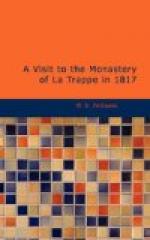The latter is in the old and decaying Chateau on the bank of the river, called Goulemme. One of its bastions was blown up a few years since by accident, which has shaken and destroyed the whole fabric; but it is still capable of holding a garrison, and is a fine monument of ancient fortification. It was once the residence of Henry IV. of France, at the time he signed the celebrated edict, (1598,) in favour of the reformed religion, afterwards revoked by Louis XIV. in 1685, and which occasioned such deplorable consequences to the French nation.
M. de Sainte Foix, in his historical Essays upon Paris, vol. i. p. 113, speaking of the Rue de Grenelle, in the quarter of Saint Eustache, gives the following curious account of the birth of this great King, whose memory is revered in France, beyond that of all the other monarchs who have swayed the Gallic sceptre.
“Jeanne d’Albret, being desirous of following her husband to the wars of Picardy, the King her father told her, that in case she proved with child, he wanted her to come and lie-in at his house; and that he would bring up the child himself, whether a boy or a girl. This Princess finding herself pregnant, and in her ninth month, set out from Compiegne, passed through all France as far as the Pyrenees, and arrived in fifteen days at Pau in Bearn. She was very desirous to see her father’s will. It was contained in a thick gold box, on which was a gold chain, that would have gone twenty-five or thirty times round her neck. She asked it of him:—’It shall be yours,’ said he, ’as soon as you have shown me the child that you now carry; and that you may not bring into the world a crying or a pouting child, I promise you the whole, provided that whilst you are in labour, you sing the Bearnese song Notre Dame du bout du Pont aidez-moi en cette heure”. No sooner was the Princess safely delivered, than her father, placing the gold chain on her neck, and giving her the gold box wherein was his will, said to her: ’These are for you, daughter, but this is for me;’ and took the child in his gown, without waiting for its being dressed in form, and carried it into his chamber. The little Prince was brought up in such a manner as to be able to undergo fatigue and hardship; frequently eating nothing but common bread. The good King his grandfather ordered it thus, and would not let him be delicately pampered, in order that from his infancy he might be inured to privation. He has often been seen, according to the custom of the country, amongst the other children of the Castle and village of Coirazze, bare-footed and bare-headed, as well in winter as in summer. Who was this Prince?—Henry IV.




